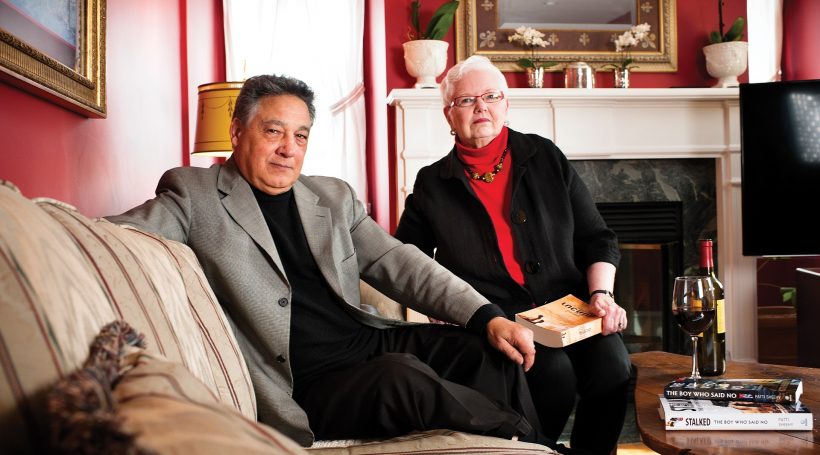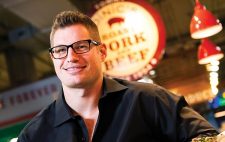Frank Mederos has been having the same dreams for nearly 50 years. They’re full of danger, daring and near-disaster. The cast of characters includes spies, villainous militants, a wise grandfather and a breathtakingly beautiful woman. In these dreams, Mederos’ very life is always on the line; but then, so is his freedom.
One more thing about these dreams – they’re all true.
In 1967, at the height of the Cold War, Frank Mederos, a then 19-year-old member of Fidel Castro’s Special Forces, defected from the army and spent five months as a fugitive before successfully escaping Cuba by sea.
Mederos’ daunting flight to freedom is chronicled in two acclaimed novels: “The Boy Who Said No,” and its sequel, “Stalked,” both penned by Haddon Heights’ Patti Sheehy.
Though the books have won national awards and become No. 1 bestsellers on Amazon, the partnership between Mederos and Sheehy had humble beginnings. Sheehy was working as a marketing director at Kennedy Health System when she was approached by, she says, “a beautiful young woman.”
“She said her father had an incredible story, and she was looking for someone to write a family history – just four or five pages,” Sheehy recalls. “She knew I did some writing, so she asked me to meet with him. I didn’t set out to write a book. In fact, I had no intention of writing a book, but when Frank started talking he was so charming and easy to be around, and his story was so interesting.”
“I, like most Americans, knew three things about Cuba,” Sheehy continues. “I knew it was 90 miles off the coast of Florida, I knew that’s where the Bay of Pigs happened and I knew about the Cuban Missile Crisis. The things Frank told me were revelations. By the time we finished our third meeting, I said, ‘Frank, are you game for a book?’ And, well, Frank’s game for anything.”
Over many Tuesday nights, Mederos told Sheehy the story of his childhood in Cuba, recounting tales of fishing with his abuelo and his experience in the Cuban “Literacy Brigade,” which sent young men to impoverished villages to teach their host families to read and write. He spoke of his conscription into service in the rugged mountains of Cuba, where he worked for months at a stretch alongside poor farmers. Mederos described watching his country, a place Christopher Columbus called “the most beautiful land that human eyes have ever seen,” fall to Communism.
“Really, I didn’t know whether or not the Americans were the enemy,” he says. “What I did know was that Castro’s government was not right for Cuba. That really hit home when I was sent to the mountains. I came back, and all the richness of the Cuban culture had disappeared within a couple of years.”
Though the young Mederos dreamt of higher education, he was soon drafted into the army. Ironically, the good grades that would have propelled him into college qualified him for a position in the Special Forces, where he received highly specialized combat and weapons training. The political rhetoric was constant, but Mederos never wavered. He was no Communist.
“They tried,” he says. “But they never conquered my mind. I knew it was wrong.”
As families began to apply for then-scarce but available visas so they could leave Cuba, Mederos faced a difficult decision. One such family was that of his girlfriend, Magda, whom he planned to marry. They ultimately asked Mederos to come with them to America. It was no small request; as a member of the Special Forces, privy to military intelligence, he’d never be granted a visa. He would have to escape in secret.
“We were meeting in desperation, with life at stake,” he says. “They couldn’t leave their daughter behind, and their daughter didn’t want to leave without me, so there’s only one choice. This was a time when you couldn’t trust anyone. You couldn’t even trust your own family not to turn you over. My girlfriend was the last push to get out, but I think I would have come here regardless. I would have never made it in Cuba. That’s the beauty of all of it; this was all for love. But that didn’t mean it was going to work. Back in those days, nobody really escaped from Cuba. Everybody got killed or caught and put in jail. The government prided itself on that.”
Thanks to his knowledge, training, determination and a significant amount of good old-fashioned luck, Mederos made it out, sailing a boat loaded with other refugees – and commandeering another halfway to international waters. The group was picked up by a Guatemalan freighter, which was shortly boarded by members of the American Coast Guard, who, “in the name of the president, Congress and people of the United States,” welcomed Mederos and his fellow refugees to freedom.
The story and its characters are riveting, and after their meetings Sheehy says she couldn’t wait to write the new material. When the book was ultimately published, a little over a year after their meetings began, it was dubbed a “true-life novel,” rather than a biography or memoir. (Mederos’ quest to reunite with Magda is dramatically resolved in the second novel.) Much of what Mederos recounted was impossible to fact-check, and though his experiences are written as they happened, there are scenes in the books for which he was not actually present.
“The response has been phenomenal for me,” Sheehy says. “To write a first book at 63 and have it be so well-received is very satisfying and very humbling. What made it easier for me was I didn’t need to invent the story. I was given a fascinating adventure story on a silver platter. How could you not write a book about that? My job was to do the material, the characters, the history – and Frank – justice. Every week after we spoke, I’d write. There were weeks I couldn’t wait to get to my computer to get it down. He had a keen memory for dialogue and conversation. There were conversations between other characters, where Frank wasn’t there, so that had to be constructed.”
Despite the necessary liberties, Mederos still considers everything very true to life.
“You have to understand, I know the characters so well, I can tell you what they said and I know I have it right,” he says. “And there wasn’t another way. I wasn’t going to go back to Cuba and say, ‘Hey, Mr. Castro, can you tell Patti that you shook hands with Frank Mederos one time?’”
“The Boy Who Said No” has been added to the curriculum at schools all over South Jersey, including Rowan and Rider Universities and a number of middle and high schools. Often, Mederos and Sheehy are invited to speak to students and other groups who have read the book.
“At Berlin Community School they read the first couple chapters very closely and are tested on the concepts, and they do research projects,” Patti says. “So when we go they’re very excited, because they’ve read the beginning and they’re hooked. It’s a great book for young readers, because it starts when Frank is 12 and ends when he’s 19. It’s also age-appropriate; there’s not a lot of violence or sex, but there’s a lot of adventure. It’s really cute when we go to these schools. They’re so excited; they all come up, and they want to touch Frank.”
Because of the wide audience appeal, Patti says there has been discussion about creating a television series or film based on Mederos’ life story.
“We’ve been approached by a company in England with the possibility of doing a TV series or film,” she says. “We’ll have to see where that goes, but that may be the next big project for us. We get comments like, ‘I didn’t know this about Cuba’ or, ‘I’ve learned so much about history’ or, ‘It’s changed my mind on immigration; you’ve made me cry, you’ve made me laugh.’ To be able to evoke those kinds of emotions and responses in the reader is something I didn’t anticipate, and it’s very satisfying.”
Mederos says speaking to readers’ groups and meeting people who’ve been touched by his story is rewarding, but the biggest benefit he’s received is a newfound peace of mind.
“Our first meeting took place 45 years after I came from Cuba, and I’d never spoken or wanted to speak to anyone about what I went through when I escaped,” he says. “That was so traumatic to me, and I really wanted to just put it away in the back of my mind. I wanted to forget about it. I lived with that all my life here. There were a lot of nightmares, and I never talked about it, never went to therapy. I told Patti my story, and that was the only therapy I ever had and by the end, it cured me.”
When Mederos came to America, he was resigned to the idea of never again setting foot on Cuban soil. But with the loosening of travel restrictions came a desire to see the many family members who remained on the island. He returned for the first time in 2011.
“It was a tremendous experience,” he says. “My sister had told everybody I was coming after so many years, and the most incredible thing happened. There were dozens and dozens of people lining the street to welcome me and shake hands with me. That’s not something you do in a Communist country, but even Communists who live in town were shaking my hand saying, ‘Hey, welcome back, you look great.’”
“I went back as an American citizen,” he continues, “and I spent 10 glorious days there. The country is devastated, but you know, people are happy. Fidel stopped history in his country, but now nobody in Cuba is talking about politics anymore. The main concern is not Castro or the United States or Communism. They’re more concerned about what they’re going to find for dinner tomorrow.”
Sheehy says both “The Boy Who Said No” and “Stalked” contain important themes, particularly at a time when national debate over immigration reaches new levels of bitterness.
“I want people who read this book to cherish their freedom and to know how precious it is and what people go through to obtain it,” she says. “Appreciate the immigrant experience. These are people who’ve gone through such trials and tribulations to get here; Frank came here with $5 in his pocket, didn’t speak a word of English, and look at him know. There’s a good reason America is so successful, and it has a lot to do with immigrants.”
Despite his adventures, Mederos is a humble, hardworking man who embodies the American Dream; a dream he risked everything to achieve and one he doesn’t take for granted.
“The first time I saw the book and held it in my hands, I looked down and thought, ‘This is my whole life, published,’” he says.
“It’s so overwhelming and I feel so humbled – really all I did was escape from Cuba in a boat. But the more important thing is I put my whole life on the line for freedom. No matter where we go, we hear the same thing from everybody. They say, ‘Oh, I read it in two days, one day;
I couldn’t stop. I can’t believe this all happened.’ Well, it happened. It happened that way. It happened to me.”












